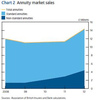Disintermediation: the hidden danger of the annuity market
Article Abstract:
Life insurance companies must minimize the risk of disintermediation, which occurs when annuity holders withdraw funds prematurely, often during periods of increased interest rates. Interest rate increases hurt the value of companies' fixed income investments, such as long-term bonds, putting companies at substantial risk due to disintermediation. Rate increases have the biggest impact on companies selling large numbers of deferred annuities and similar products. Companies can protect themselves by avoiding imprudent long-term investments, matching liabilities to assets, and by selling both low-risk and high-risk products.
Publication Name: Journal of the American Society of CLU & ChFC
Subject: Law
ISSN: 1052-2875
Year: 1996
User Contributions:
Comment about this article or add new information about this topic:
Demographic and financial characteristics of small business owners
Article Abstract:
Most small business owners are more educated and wealthier than the average American, according to a survey of 1,006 businesses with less than 100 full-time employees by LIMRA International. The home ownership rate was 92% and 44% had investments of $100,000 or more. Small business owners are generally better insured than most Americans, with 88% carrying individual life insurance policies. They also used many other financial products, making them a good market for insurance agents. Women small business owners make up 21% of owners and are less likely to already have life insurance.
Publication Name: Journal of the American Society of CLU & ChFC
Subject: Law
ISSN: 1052-2875
Year: 1997
User Contributions:
Comment about this article or add new information about this topic:
The taxation of equity split dollar plans
Article Abstract:
The IRS ruled in Technical Advice Memorandum 96-04001 that equity split dollar life insurance arrangements are taxable to the employee on a year-to-year basis. Under equity split dollar arrangements, all growth in equity values belongs to the employee, once the time is reached that cash values exceed the amount needed to reimburse the employer for premiums. Comparison of possible tax treatments shows that the year-by-year method is the least favorable, but equity split dollar plans will still hold some appeal as a means of compensating and insuring executives.
Publication Name: Journal of the American Society of CLU & ChFC
Subject: Law
ISSN: 1052-2875
Year: 1997
User Contributions:
Comment about this article or add new information about this topic:
- Abstracts: An evaluation of section 232(4) of the Corporations Law and the directors' duty of due care, skill and diligence
- Abstracts: An ounce of prevention. The Federal Reserve and investment policies for insurers
- Abstracts: Heading back to the thicket: voting district cases pose politically and racially charges questions. Stuntpersons add drama to cases; accidents are re-created to support litigants' version of events
- Abstracts: Fear of filing: securities fraud plaintiffs steering clear of federal restrictions by suing in state court, study says
- Abstracts: IRS permits rollover of retirement annuity contract that passes through a marital deduction. UCA rollover rules amplified in new guidance addressing plan loans, minimum distributions, and NUA withholding



